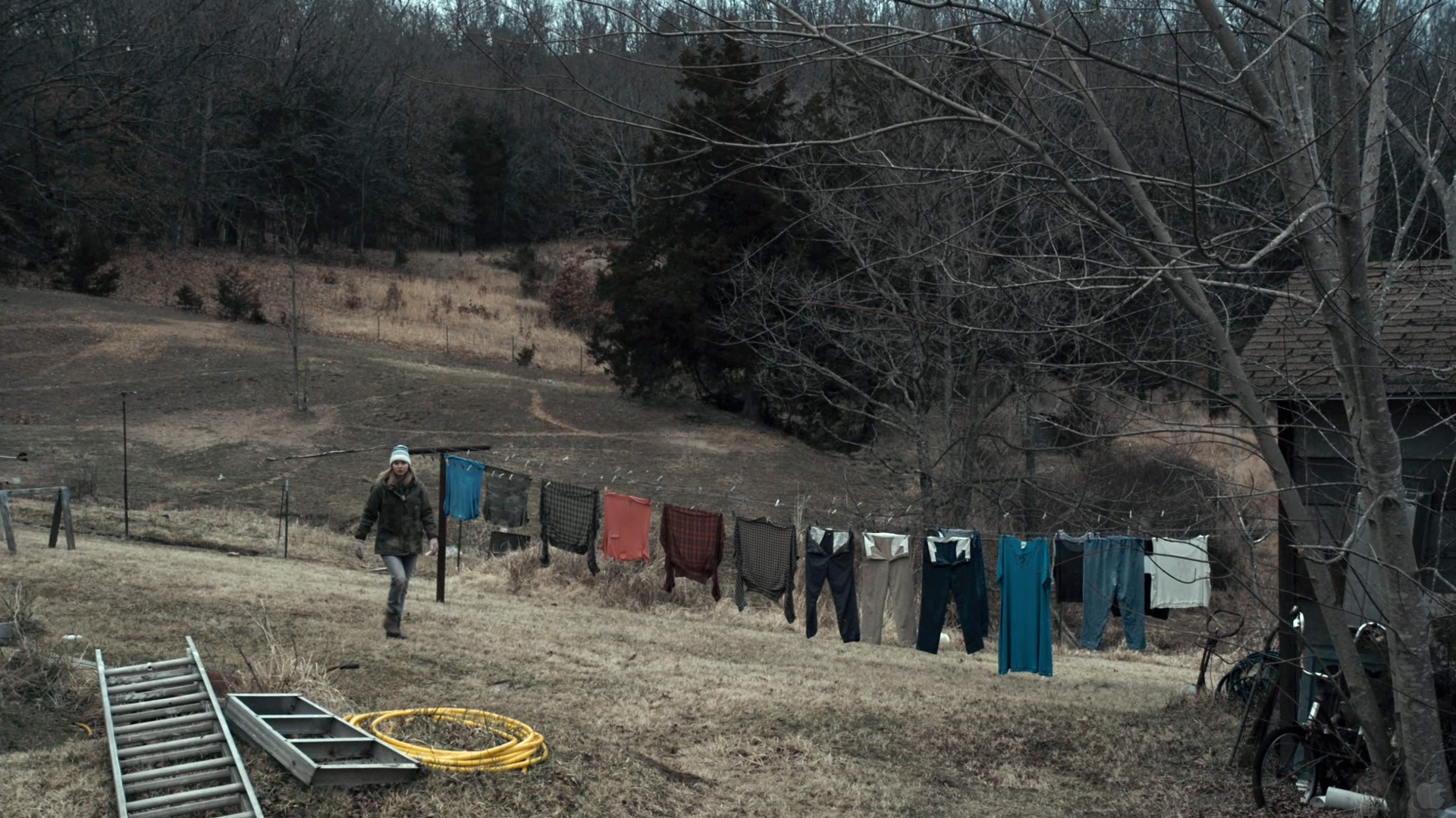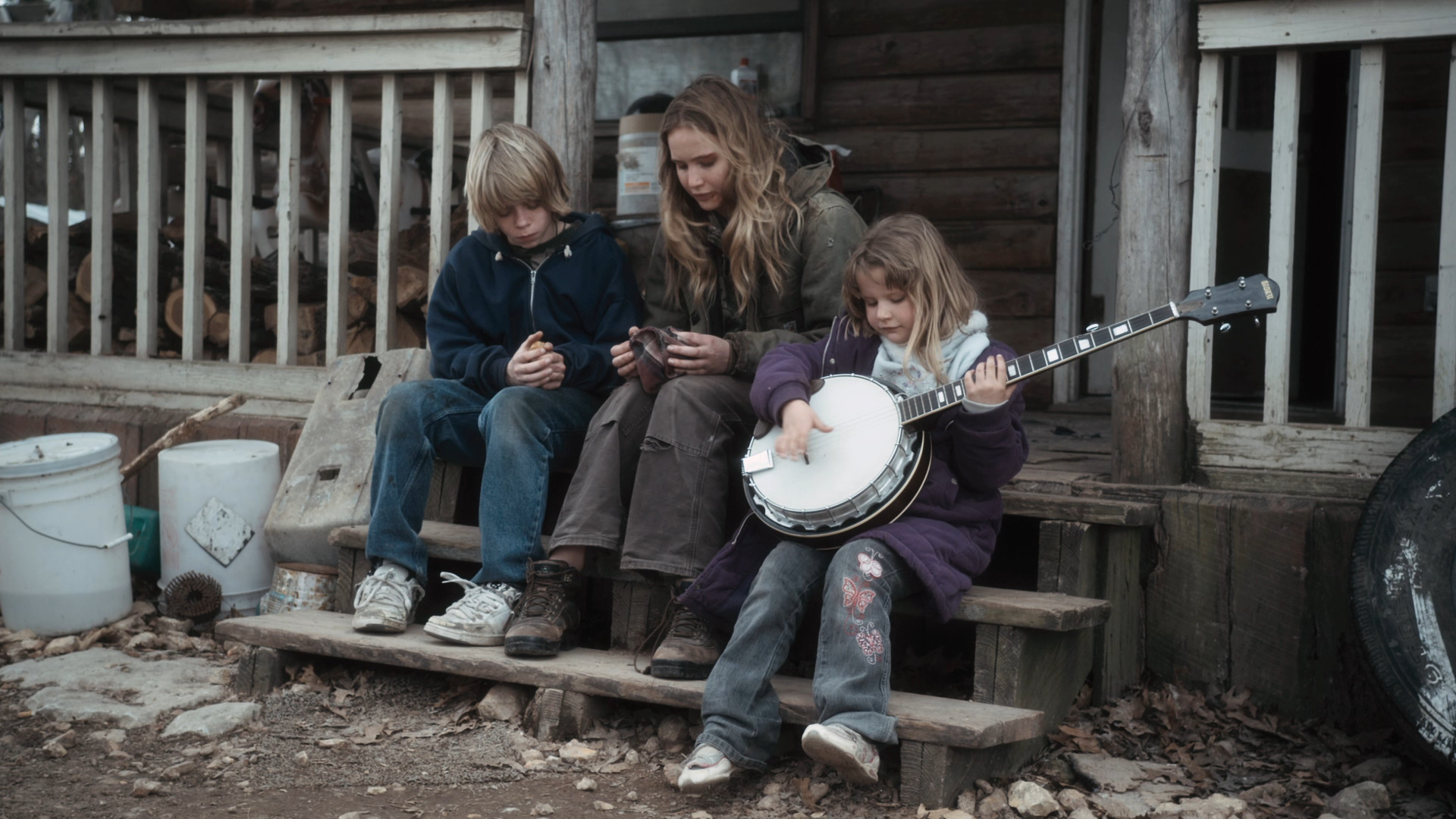Jennifer Lawrence as Ree Dolly in Winter's Bone
Ree Dolly walks her much younger brother and sister to school, quzzing the latter in spelling and arithmetic. Ree should be on her way to school as well; she's only 17, after all. But we see her drop her siblings off and then wander around the school, clearly an outsider, much as there are nods of recognition among she and some of the kids her age. She watches students in a classroom handling lifelike infant dolls in some sort of family skills class, another motley group marching haphazardly down a hallway and into the gymnasium as part of a ROTC drill. Ree observes these exercises, her contemporaries essentially playing at life, with a kind of disbelief, mouth slightly agape. Being able to play at tending to children or even entering the military in reality are not luxuries she can afford. She's too busy with real life.
As usual, Ree's father, Jessup, is absent. Her mother, having long suffered the vicissitudes of her hard life with Jessup, exists in a kind of emotional coma. So, it's up to Ree to see after her young siblings and silent mother. To compound that burden, she finds out that her father, arrested again for "cooking," which is to say making crystal methamphetamine, has put up their home and land as security to post bond. If he doesn't show up for trial in a matter of days, the family will have nowhere to live. Thus begins Ree's harsh odyssey.
Odyssey indeeed. As I heard director and co-writer Debra Granik point out in an interview, there is something mythic in this young woman's quest to find her father. Not to spoil the mystery which is to unravel, but this is both an odyssey and something of an Ozark Antigone.
Young Ree reminded me of another fierce protagonist from a 2010 film about a young woman trying to make her way in a forbidding environment. She's like the peripatetic Mia (Katie Jarvis) in Andrea Arnold's almost equally good Fish Tank. God knows the southern Missouri environs of Winter's Bone are nearly as alien to most Americans as the Essex housing estates we see Mia wander in Fish Tank.
This is Debra Granik's second full-length feature, after 2004's Down to the Bone. In that film, drugs, mainly the cocaine addiction of its main character, played by Vera Farmiga, are front and center. In Winter's Bone, crystal meth. lurks in the background like a plague. As one young woman says to Ree when she speaks of why her father has run afoul of the law again, "there's no need to say it out loud, everyone's doing it." Ms Granik co-wrote the script for Winter's Bone with Anne Rosellini, adapting the novel of the same name by Daniel Woodrell. Mr. Woodrell was born in the Missouri Ozarks and joined the military the week of his 17th birthday, before graduating college and turning to writing. He would seem to know whereof he speaks.
In both the non-judgemental script and the judicious sweep of camera, there's a depth of understanding here, not just for a people, but their dwellings, for the archaelogy of the region, which is spelled out not simply in rocks or the gentle convex slope of the hillls, but in abandoned vehicles, applicances, objects left in yards as tokens of indifference, pride or quiet distress. The camera takes note of these things without ever dwelling for effect.
As Ree goes from station to station, trying to determine the whereabouts of her father, she's met with women who act as gatekeepers to their homes and land. These women are wary and fierce by instinct, capable of surprising kindness when they deem it safe and appropriate to dispense it. This is true of her neighbor Sonya (Shelley Waggener), who at first glance looks almost hateful, but who subsequently allows Ree to bring the family's starving horse into her corral and brings food to the family who are forever in need of a good meal. But "don't ask for what should be offered," Ree admonishes her young brother. That apparently one dictum from a firm, but largely unspoken code by which she lives.
 Among the women we see here, the young and old, none is more memorable than Merab, played with stony conviction by Dale Dickey. Ms. Dickey was born in Knoxville, Tennessee, and in her face there is the jaw line and hard set features of a lean, old before her time type of Southern woman. I've heard people speak about a kind of matriarchy when discussing Winter's Bone. I'm not sure that's the case. Merab, after all, is the gatekeeper and perhaps consort to a kind of crime boss figure call Thump, by whom virtually all men and women are cowed. And as she says when we first see her encountering Ree, "Ain't you got no men who could do this?"
Among the women we see here, the young and old, none is more memorable than Merab, played with stony conviction by Dale Dickey. Ms. Dickey was born in Knoxville, Tennessee, and in her face there is the jaw line and hard set features of a lean, old before her time type of Southern woman. I've heard people speak about a kind of matriarchy when discussing Winter's Bone. I'm not sure that's the case. Merab, after all, is the gatekeeper and perhaps consort to a kind of crime boss figure call Thump, by whom virtually all men and women are cowed. And as she says when we first see her encountering Ree, "Ain't you got no men who could do this?"
But these are perforce tough, tough women, who do most of the work in their world, dirty and otherwise. When Ree comes a-calling one too many times to get some information from the powerful and oracular Thump, it's Merab and a small group of women who assault her and haul her into a nearby pole building, to mete out, after an aluminum garage door ominously descends, what one fears will be a dire fate.
 Even more searingly memorable is John Hawkes, playing Ree's uncle, Teardrop. Teardop looks more than a little like a young(er) Charles Manson. Beyond tattoos, he even has some of the same small, cryptic markings about the face as America's favorite bogeyman (pre-Bin Laden, at least). Most notably, there is a permanent darkness in the eyes; they are those of a lost soul. I'm not sure how actors do this. There's the same thing, or lack of anything, to be seen in Sean Penn's eyes in Dead Man Walking. Perhaps it's really great contact lenses, but it goes rather beyond that. Despite Teardrop's slight stature, the dread he engenders in men who themselves would inspire fear in most onlookers is quite believable. Even the sheriff, armed with a pistol, backs away from Teardrop's truck one night when Ree's uncle refuses to get out. "Is this is our time?" he asks, in one of his typically terse, almost biblical utterances.
Even more searingly memorable is John Hawkes, playing Ree's uncle, Teardrop. Teardop looks more than a little like a young(er) Charles Manson. Beyond tattoos, he even has some of the same small, cryptic markings about the face as America's favorite bogeyman (pre-Bin Laden, at least). Most notably, there is a permanent darkness in the eyes; they are those of a lost soul. I'm not sure how actors do this. There's the same thing, or lack of anything, to be seen in Sean Penn's eyes in Dead Man Walking. Perhaps it's really great contact lenses, but it goes rather beyond that. Despite Teardrop's slight stature, the dread he engenders in men who themselves would inspire fear in most onlookers is quite believable. Even the sheriff, armed with a pistol, backs away from Teardrop's truck one night when Ree's uncle refuses to get out. "Is this is our time?" he asks, in one of his typically terse, almost biblical utterances.
In lesser hands, those of writers and actor, Teardrop would be some sort of one dimensional, backwoods psychopath. We certainly see the dark side. Ree's first stop as she tries to determine the whereabouts of her father is at Teardrop's house. Her typical tenacity in trying to elicit information from Teardop results in her uncle choking her. He had previously admonished his wife, speaking with typically chilling economy, "I already warned you once with my mouth." But a perverse sort of uncle/niece bonding occurs as Teardrop gets increasingly involved in Ree's quest. Whatever sliver of humanity he's got left he brings to the aid Ree and his brother's family. Even after all that, Ree acknowledges that she's always been kind of scared of her uncle. "That's cuz yer smart," he replies, with a kind of matter-of-fact resignation.
Ree's quest has a grim denouement. Merab and a couple of her female attendants first drive a hooded Ree some distance from her home and then ferry her out into a swamp. Something happens in this scene - also mythical in its way, essentially a passage through the Ozark underworld - which reminded me of an action that takes place near the end of the Cohen Brothers Fargo. What happens in Winter's Bone, something that evokes an almost silent scream from Ree, is both unpredictable but gravely logical. The similar action in Fargo is a memorable shot, but it seems primarily that, a great shot concocted by gifted filmmakers.
 The Cohens have been labeled misanthropes for their various, often cartoonish depictions of Americana. Misanthrope might be too strong a word. Maybe it's not. But as I watched Winter's Bone, it did occur to me more forcefully than ever what cultural dilettantes the Cohens can be, what gaping and snickering tourists at times, however gifted they are.
The Cohens have been labeled misanthropes for their various, often cartoonish depictions of Americana. Misanthrope might be too strong a word. Maybe it's not. But as I watched Winter's Bone, it did occur to me more forcefully than ever what cultural dilettantes the Cohens can be, what gaping and snickering tourists at times, however gifted they are.
Ms. Granik is not a tourist. A visitor, certainly, but not a tourist. There is frequently a documentary-like clarity about Winter's Bone. But even documentaries can add an inadvertent luster to the most unsavory of subjects. A camera just does that. To really know any place you need to live it, and you probably don't want to live the world of this film. But toward the end of providing an insightful and compassionate window on these Ozark counties and this young woman's story, Ms. Granik succeeds admirably. Toward the end of making an intelligent and completely absorbing film, she succeeds completely. I could have watched this film for hours more had it continued. If there's been a better American film released this year, I'd be thrilled to see it.
db




Comments
Post a Comment